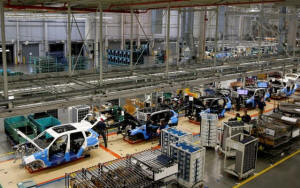|
President Trump's administration last month launched an
investigation into whether auto imports posed a national
security threat and Trump has threatened to impose a 20 percent
tariff on all imports of EU-assembled cars.
"The domestic manufacture of automobiles has no apparent
correlation with U.S. national security," BMW wrote in a letter
to U.S. Secretary of Commerce Wilbur Ross this week, adding that
imposing duties would not increase U.S. growth and
competitiveness.
The BMW plant in South Carolina is its largest globally and
ships more than 70 percent of its annual production to other
export markets, the company said.
Chinese tariffs on U.S. passenger cars, imposed in retaliation
for U.S. duties on Chinese goods, have already hiked up the cost
of exporting to China, BMW said. Any U.S. tariffs would likely
lead to further retaliatory measures from China and the European
Union.
In addition, higher tariffs on components imported to the United
States would make other production locations outside the country
more competitive.
"All of these factors would substantially increase the costs of
exporting passenger cars to these markets from the United States
and deteriorate the market access for BMW in these
jurisdictions, potentially leading to strongly reduced export
volumes and negative effects on investment and employment in the
United States," BMW said in the letter.
Two major auto trade groups, one representing BMW among others,
had earlier this week said that imposing up to 25 percent
tariffs on imported vehicles would cost hundreds of thousands of
jobs, dramatically hike prices on vehicles and threaten industry
spending on self-driving cars.
"By insulating the United States from foreign competition, there
is less incentive for American companies to strive to raise
their productivity and look for ways and means of producing ever
better goods (and services) ever more cheaply," BMW said.
(Reporting by Victoria Bryan; Editing by Clelia Oziel)
[© 2018 Thomson Reuters. All rights
reserved.] Copyright 2018 Reuters. All rights reserved. This material may not be published,
broadcast, rewritten or redistributed.
Thompson Reuters is solely responsible for this content.
 |
|




